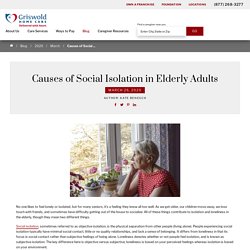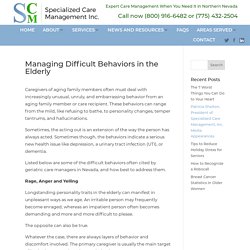

APA Dictionary of Psychology -social isolation. Social Isolation in the Elderly: The Neglected Issue. Your Brain On Social Distancing: Loneliness & Isolation During The COVID-19 Coronavirus. APA Dictionary of Psychology -loneliness. N. 1. a perspective that begins with a presumption of the inherent dignity and worth of humankind and, as a scholarly or artistic discipline, focuses attention on the study and representation of human beings and human experiences.

The roots of Western humanism lie in the Renaissance period, when those who studied the classical Greek and Roman languages and writings became known as humanists. 2. any position taken in opposition to religious belief or other forms of supernaturalism. Measuring Social Isolation Among Older Adults Using Multiple Indicators From the NSHAP Study. Social Disconnectedness, Perceived Isolation, and Health among Older Adults. Causes of Social Isolation in Elderly Adults.
No one likes to feel lonely or isolated, but for many seniors, it’s a feeling they know all too well.

As we get older, our children move away, we lose touch with friends, and sometimes have difficulty getting out of the house to socialize. All of these things contribute to isolation and loneliness in the elderly, though they mean two different things. Social isolation, sometimes referred to as objective isolation, is the physical separation from other people (living alone).
Aging & Isolation — Causes and Impacts. January/February 2017 Issue Aging & Isolation — Causes and Impacts By Lauren Snedeker, LMSW Social Work Today Vol. 17 No. 1 P. 24 Many older adults experience aging as a positive time because they remain active and connected to others, but many other elders become disconnected from family, friends, and community.

This article examines the causes and results of isolation and how social workers can help reduce its impact. Older adults comprise the fastest growing segment of the population, with some 10,000 baby boomers turning 65 every day, a rate the U.S. Census Bureau estimates will continue until the year 2030. Social workers are clinically trained to evaluate and triage clients' needs in efforts to provide adequate and efficient support.
What does normal development in the elderly look like? Effects of isolation on their development & health. Substances. Elderly & Suicide. Identify Identify Identify. Measuring social isolation. Managing social isolation. Prevention is better than cure! Why are your aging parents so stubborn? Researchers think they have the answer.
Aging parents grow stubborn, and researchers are uncovering the reasons why.

Studies show not only do adult children complain that their parents are stubborn — the parents themselves admit it. Typically, “as children become more involved, they may make suggestions for things that older adults might do to maintain their safety and well-being, only to find out that older adults see things differently,” according to the study of 189 aging parents with an adult child. Researchers say a key reason is differing goals of children and parents. An aging parent might want to exercise independence by walking to the store for groceries, but the child may see it as risking a fall.
An aging parent might want to exercise independence by walking to the store for groceries, but the child may see such a venture as risking a fall. One-third reported stubborn behavior at least once, and about one in five reported risky behavior at least once in a seven-day period. Why Are Seniors Reluctant to Accept Help? Adult children may find themselves in a situation where they have a new added responsibility for their parents because of their reluctance to accept at-home assistance or care.

Geriatrician Lee A. Managing Difficult Behaviors in the Elderly. Caregivers of aging family members often must deal with increasingly unusual, unruly, and embarrassing behavior from an aging family member or care recipient.

These behaviors can range from the mild, like refusing to bathe, to personality changes, temper tantrums, and hallucinations. Sometimes, the acting out is an extension of the way the person has always acted. Sometimes though, the behaviors indicate a serious new health issue like depression, a urinary tract infection (UTI), or dementia. Listed below are some of the difficult behaviors often cited by geriatric care managers in Nevada, and how best to address them. Rage, Anger and Yelling Longstanding personality traits in the elderly can manifest in unpleasant ways as we age. The opposite can also be true. Family Caregiving Roles and Impacts - Families Caring for an Aging America - NCBI Bookshelf.
Caregiver Stress and Burnout. What is caregiver burnout? While caring for a loved one can be very rewarding, it also involves many stressors. And since caregiving is often a long-term challenge, the emotional impact can snowball over time. You may face years or even decades of caregiving responsibilities. It can be particularly disheartening if you feel that you’re in over your head, if there’s no hope that your family member will get better, or if, despite your best efforts, their condition is gradually deteriorating. Structural limitations.